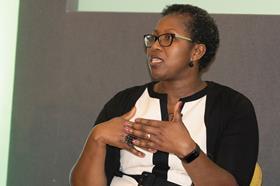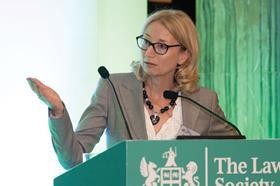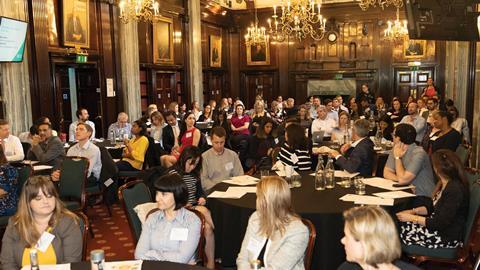Last month’s two-day conference ‘Advancing the role of the in-house lawyer’ treats us to a cornucopia of comments that, although often controversial, are always inspirational. ITV director of legal and third party sales Barry Matthews, for instance, urges in-house lawyers to tell sceptical non-lawyer colleagues: ‘I’m not the Ministry of No Fun or the Protect Your Arse insurance company. But I might just be the person who saves you from going to jail.’
The low down
As clients, general counsel get to call the shots. This is a power they have been increasingly willing to use, demanding improvements in service and cost-control, and changes to the way law firms meet their ever-growing legal needs. But as in-house lawyers at the Law Society’s In-House Division annual conference reflect, they need to be demanding. The challenges of working in-house are many – from managing careers and personal development to dealing with risks that, mishandled, could destroy the business. The vastly increased use of technology in law promises much, but technology is also complicating business and risk. It is this heady mix that many in-house lawyers choose and thrive on – being at the heart of events can be exhilarating. That is just as well. As one speaker observes: for in-house lawyers the time after a crisis is just the time before the next crisis.
As clients, general counsel get to call the shots. This is a power they have been increasingly willing to use, demanding improvements in service and cost-control, and changes to the way law firms meet their ever-growing legal needs. But as in-house lawyers at the Law Society’s In-House Division annual conference reflect, they need to be demanding. The challenges of working in-house are many – from managing careers and personal development to dealing with risks that, mishandled, could destroy the business. The vastly increased use of technology in law promises much, but technology is also complicating business and risk. It is this heady mix that many in-house lawyers choose and thrive on – being at the heart of events can be exhilarating. That is just as well. As one speaker observes: for in-house lawyers the time after a crisis is just the time before the next crisis.
Digital tools development company Smartmatic GC David Melville is equally direct with his advice. ‘Identify the geek – every department has one – and unleash [them] when tackling new technology. And if the geek decides to leave, join me as first out the door behind [them].’ Former pharma giant Novartis GC Felix Ehrat tells us: ‘Never miss a good crisis. It’s a great learning experience and the only way that companies and organisations will mature.’
A presentation on the changing career expectations of in-house lawyers quickly gets us to the crux of the matter. ITV’s Matthews, a panel speaker, counsels: ‘Be completely honest with individuals about their true prospects. Show them, for example, that you are not only hiring laterally for senior positions, but that the opportunity is there for them to grow within the business. And if someone is leaving, coach them on their exit because hanging on to someone who wants to move on is unproductive.’ In summary: ‘Basically, show you give a shit about people.’
Action for Children charity head of legal services Emma Dickinson, the second panel speaker, agrees: ‘Everyone, millennials included, wants to be able to develop. Focus on expanding your skill sets. It is many years since I met anyone who is content with where they are and doesn’t want to go forward.’
Asked about funding, Dickinson says: ‘Doing things without a budget is familiar to all charities. My advice is to look to your own teams. Some of them will have skills that you didn’t know about. Some of mine even have law degrees.’ She concludes: ‘It’s all about trust and mutual respect. Certain of my board members still call me “Young Emma”.’
You need a combination of technology and a legally trained mind to achieve the best results. We will never be replaced by machines
Sharon Blackman, Citi
The Gazette moves on to breakout session ‘Recruitment and retention – the importance of mentoring’. Essex County Council head of advocacy Natasha Taylor, who chairs the session, poses a key question: ‘How do you find a suitable mentor?’ Canon Europe’s Toby Hornett replies: ‘There are formal matching schemes, like mosaicforlawyers.com, which is not-for-profit and aimed at in-house lawyers. But you should also look around and find someone you respect and ask him or her. But bear in mind that asking someone to be your mentor is like asking someone to marry you. Think long and hard about it.’
Principal Global Investors head of legal Shika Soni says: ‘I’ve a number of mentors and not all of them are lawyers. They all inspire me in different ways and I go to them for different reasons. I once emailed a FTSE 100 chief executive and invited her to meet me for a coffee. She did so.’ Soni emphasises that although a mentor is important, you also need to work hard at your own personal development. ‘I devised my own development pathway, which delineated the various steps I needed to take to become a GC, and followed it faithfully.’ She shares her five pointers to success: ‘Never underestimate the importance of relationships. Be flexible in your thinking. Grasp challenges so as to upskill. Communicate meaningfully. And be yourself.’
We move on to ‘How to be a smart purchaser of technology’. Law Society director of legal and regulatory policy Sophia Adams Bhatti, who chairs the discussion, sets the ball rolling with: ‘Where do you find the time and capacity to engage with new technology?’ Technology company Onfido’s GC Amy Wallace advises: ‘Go to your network, in particular external counsel, and ask how they managed it. Do they have any cheat sheets? What were the problems?’
Smartmatics GC Melville argues: ‘Start by assessing where the time and money goes. And you need to ask yourself where you really deliver value. Then identify the most critical pinch points that lend themselves to a technological solution and unleash the geek – the member of your team who is comfortable with technology.’
Trainline chief of staff Holly Manvell observes that administration takes up a ‘disproportionate’ amount of time, but lends itself to automation. ‘The aim behind investment in technology is to improve efficiencies without sacrificing quality. You need to understand what people really want from the technology. It’s about acumen, certainly, but it doesn’t have to be too technical. After all, people leave and newcomers join. You can’t constantly be training your team members.’
The conference’s first day ends with ‘Achieving closer alignment between the in-house legal function and the needs and priorities of the organisation – key strategies’. Simon Dodds, of counsel, Shearman & Sterling, chairs the session.
Hats the way to do it
How do I effectively tie legal risk to the risk appetite of the business?’ is one of several workshops designed by LexisNexis, the conference’s principal sponsor. It revolves around Edward de Bono’s Six Thinking Hats model. In essence, the model encourages people to approach problems from different perspectives, depending upon which of six different coloured hats they are wearing.
London Metal Exchange senior legal counsel Richard Armstrong wonders, provocatively: ‘What is my organisation? My client [the London Metal Exchange] hasn’t changed, but in my time there the organisation has reinvented itself several times as three different CEOs, all with their own way of working, have stamped their identities on it.’
Chris Fox, chief legal officer of sports betting service provider Kambi, confides: ‘I’m not very interested in sport and I never gamble, but that’s immaterial. What is crucial is investing time in really understanding your organisation. Closer alignment can then follow.’ Barclays chief of staff Jon Doyle concurs: ‘It’s not enough just to read the Financial Times. You need to sit with the people at the coalface to fully understand your organisation’s values, culture and how it functions. ’
GC of venture capital investor MMC Ventures, Victoria Ferguson, acknowledges that in-house lawyers sometimes have to decline to provide funds or agree a contract. ‘We are not the department of “No”, but rather there are times when we are the moral compass of the organisation. You lose friends and it’s not easy or pleasant, but it’s what we have been trained and employed to do.’ Armstrong avers: ‘We are the connecting tissue that links every part of the business.’ Fox agrees: ‘We can act as consultants within the organisation because we see outside our silos. We see something which works over there, but is not being used over here – and can advise accordingly.’

Day two kicks off with multinational investment bank Citi director and deputy general counsel Sharon Blackman in conversation with Law Society strategic relationships director Stephen Denyer. She tells an amusing anecdote about how, after repeated attempts, she secured her first position as a derivatives lawyer. ‘I was at a conference about derivatives where the person sitting next to me fell asleep. He was very embarrassed when he awoke and asked me what he’d missed. I told him, of course, but as the conversation went on it emerged he was a solicitor at Abbey National – where, he said, they had a vacancy. Ten days later I had a job.’
This chance meeting endorses Blackman’s maxim that ‘anything is possible if people are willing to make the effort’. She adds that she supports people who ‘put up their hand for stretch assignments’, by which she means people who volunteer for jobs that are outside their comfort zone and will challenge their abilities. ‘You learn from every different way of delivering legal services.’
Blackman believes in technical innovation, but is confident that the lawyer brand will endure. ‘You need a combination of technology and a legally trained mind to achieve the best results. We will never be replaced by machines. In fact, now is the perfect time for the implementation of technological solutions. Nobody’s yet an expert, so anybody can become an expert.’ She ends by wondering: ‘Why do contracts still refer to fax machines? Do you know if your office has a fax machine? Where is it?’

Global firm Baker McKenzie sponsors the session ‘Taking a wider perspective on your in-house career and making a broader contribution’, which is chaired by the firm’s corporate finance partner Helen Bradley. Sybille Raphael, head of legal advice services at charity Working Families, makes a compelling case for expanding your perspective through pro bono work. ‘Pro bono re-enthuses you about your powers as a lawyer because it’s all about real life and real people. Don’t overthink it. Don’t think about the time it takes away from your busy schedule, but think about how it gives you more energy. Pro bono will widen your network, improve your strategic thinking and heighten your professional status. Also, it’s almost addictive. You’ll often see an immediate impact, unlike in your day job.’
But DHL legal counsel Nikki Elliott sounds a note of caution. ‘In-house lawyers, unlike those in private practice, do not have professional indemnity insurance. This is why so few of us dare to commit to pro bono.’ LawWorks deputy chief executive and director of programmes Rebecca Wilkinson says ‘insurance is not the barrier we think’. Instead, she urges: ‘Don’t let perfect be the enemy of good. Just get on with it and do it.’
Oxygen House Group GC Matthew Gingell reminds us: ‘If you don’t challenge yourself, you’ll just end up doing the same old things.’ Bradley ends the discussion, saying: ‘Pro bono is central to making your people more fulfilled and, what’s more, helps counter-balance those all-night sessions.’
The breakout discussion ‘How can an external role contribute to your in-house career?’ focuses on trusteeships and non-executive directorships rather than pro bono work. Bingham Centre co-chair Keith Ruddock comments: ‘As lawyers, we can be reticent about putting ourselves forward. Should we be less reticent? What value can we add to external roles?’
UNICEF vice-chair Sarah Davis responds: ‘As lawyers, we are able to read and absorb multiple files of written material. We’re also able, and this is important, courteously to disagree. We have a language or lexicon with which we can challenge the CEO, for example, in a constructive way without sounding confrontational. Allied to that, we have the emotional intelligence to read our clients – and by extension, our fellow board members.’
Pro bono is central to making your people more fulfilled and, what’s more, helps counter-balance those all-night sessions
Helen Bradley, Baker McKenzie
Former Bupa GC Paul Newton cautions: ‘You’re expected to bring common sense, acumen and business nous to the board, not your legal skills. Most board members don’t think it’s necessary to have a lawyer sitting with them. Legal advice, they believe, is something you acquire before the board meeting, not during it.’ Ruddock sounds another note of caution: ‘When you give your time freely, people take it freely.’
I. Stephanie Boyce, consultant and Law Society deputy vice-president-elect, chairs the session ‘How to develop and run a legal operations function’. Consultant GC Vicky Lockie says: ‘Start with a risk assessment.’ She also warns: ‘Without data, you are flying blind.’ DPA Professionals GC Max Hübner raises a laugh with: ‘Here’s your takeaway for today. Never, ever say “more for less” again.’
John Lewis Partnership legal operations head Maria Passemard reminds us that in-house lawyers are often the unsung heroes of the moment. ‘The boss demands to know why you have gone over budget. Because we had a huge bit of litigation, you reply, which brought £500m to the business – but not a penny to the legal department.’ NaviStar Legal Limited founder and CEO Jo Rogers unveils the steel that makes her an innovator. ‘When you delegate change to colleagues, hold their feet to the fire to make sure they are really doing things differently. Business as usual is like a tsunami – it swamps everything.’
28,000 Solicitors working in-house
£512,000 Maximum in-house salary 18+ PQE (BCL)
35% Percentage of solicitors predicted to be in-house by 2020
Breakout session ‘The rise of the CLO’ addresses the ascendancy of chief legal officers in the way businesses are run. Hans Albers, Juniper Networks chief of staff and head of global legal operations, poses the question: ‘What keeps CLOs awake at night?’ He lists some of the risks to his US network products company: ‘Huawei disruption, 25% and 10% tariffs respectively on Chinese and Mexican imports, and regulatory changes.’ And yet, he adds, many CEOs do not seek input from their CLO. So is there a practical role for the CLO in countering these threats?
A speaker from the floor says that failure of communication between CLOs and CEOs damages the business. ‘Where the CLO doesn’t have full access to the business, it’s like buying a house when all you’ve done is peek through the letterbox.’ Another speaker from the floor hints at CEO-CLO conflict: ‘The CEO says your job is to keep me out of jail. No, I say, I don’t care if you go to jail. My job is to keep the company out of jail.’
London and New York firm Mishcon de Reya sponsors the final session, on crisis management. The firm’s head of reputation protection Emma Woollcott asks how organisations prepare for crises. Islington Council’s acting assistant director of law Uma Mehta responds that ‘huge budget cuts make it difficult to plan’, but that by creating a ‘culture of honesty’ some problems can be nipped in the bud.
Uber senior counsel Jonathan Ollivent discloses: ‘People love the app, not us. We’re the naughty poster child for the gig economy. We once got blockaded in the office, which was quite exciting. More seriously, we do plan for crises, most notably with playbooks that give step-by-step guides on how to act in an emergency.’
Felix Ehrat concludes with a handy truism: ‘The time after a crisis is simply the time before the next crisis.’
The Law Society’s In-house Division annual conference 2019 took place on 18-19 June at the Law Society, London. LexisNexis was the principal sponsor and netdocuments the associate sponsor.
Contribute ideas and express your interest in speaking at the In-house Division annual conference 2020. Submissions should be received by Friday 15 November 2019. Submit your ideas here.
































No comments yet